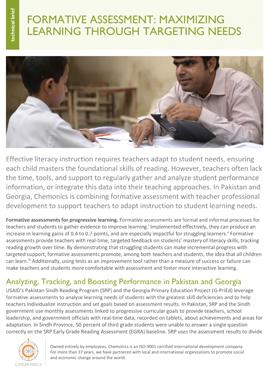To improve primary school students’ performance in reading and math, Georgian and ethnic minority schools must develop stronger instructional materials and transform approaches to teaching.

Formative Assessments: Maximizing Learning Through Targeting Needs .
Fact Sheet | October 31, 2017

USAID’s Pakistan Sindh Reading Program (SRP) and the Georgia Primary Education Project (G-PriEd) leveraged formative assessments to analyze learning needs of students with the greatest skill deficiencies and to help teachers individualize instruction and set goals based on assessment results.
USAID’s Pakistan Sindh Reading Program (SRP) and the Georgia Primary Education Project (G-PriEd) leveraged formative assessments to analyze learning needs of students with the greatest skill deficiencies and to help teachers individualize instruction and set goals based on assessment results. In Pakistan, SRP and the Sindh government used monthly assessments linked to progressive curricular goals to provide teachers, school leadership, and government officials with real-time data, recorded on tablets, about achievements and areas for adaptation. In Georgia, G-PriEd tied formative assessments to the national curriculum and assessment of literacy by empowering teachers to measure classroom-level progress toward national goals and benchmarks for reading.
